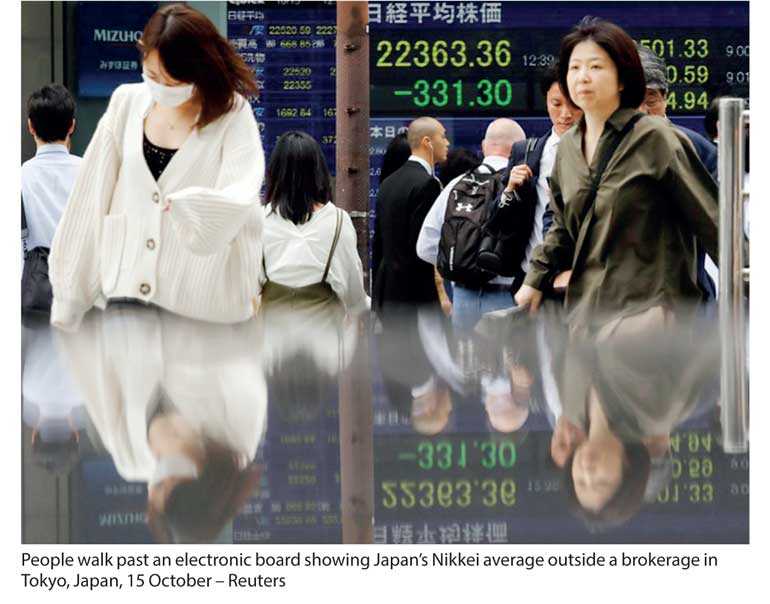Friday Feb 27, 2026
Friday Feb 27, 2026
Thursday, 25 October 2018 00:00 - - {{hitsCtrl.values.hits}}
 TOKYO (Reuters): Asian stocks turned up on Wednesday as fresh signs of stimulus from China propped up sentiment despite Wall Street’s overnight losses, while crude oil approached two-month lows after Saudi Arabia flagged possible supply increases.
TOKYO (Reuters): Asian stocks turned up on Wednesday as fresh signs of stimulus from China propped up sentiment despite Wall Street’s overnight losses, while crude oil approached two-month lows after Saudi Arabia flagged possible supply increases.
Spreadbetters expected European stocks to open higher, with Britain’s FTSE rising 0.85%, Germany’s DAX gaining 1% and France’s CAC advancing 1.2%.
MSCI’s broadest index of Asia-Pacific shares outside Japan was last up 0.2% following a decline of more than 2% in the previous session.
Global stocks had suffered this week on worries about US earnings, Italian government finances, US trade tensions and mounting pressure on Saudi Arabia over the death of dissident journalist Jamal Khashoggi.
Saudi Arabia’s diplomatic standing looked increasingly precarious as Turkey dismissed the kingdom’s efforts to blame Khashoggi’s death on rogue operatives while US President Donald Trump said Riyadh staged the “worst cover-up ever.”
Hong Kong’s Hang Seng gained 0.25% while the volatile Shanghai Composite Index was last up 1%, supported by fresh signs of government support.
South Korea’s KOSPI was 0.3% lower and Japan’s Nikkei added 0.5%.
Wall Street’s three major indexes slumped early on Tuesday but ended well off the day’s lows as investors snapped up beaten-down shares late in the session.
“Broader market sentiment remains fragile, but as last night’s resilience by Wall Street shows, sentiment has not broken down completely,” said Junichi Ishikawa, senior FX strategist at IG Securities in Tokyo.
“We may see more bouts of ‘mini panic’ until the U.S. midterm elections, but the bottom line is that the U.S. economy is in good shape and that should prevent sentiment from breaking down.”
The dollar rebounded modestly against the safe-haven yen as risk aversion ebbed, rising 0.1% to 112.565 yen after falling below 112.00 overnight.
The US currency was given a lift as the 10-year Treasury note yield rebounded to 3.162% after stooping to a three-week low of 3.111 on Tuesday.
The Canadian dollar took in stride the sharp decline in oil and stood firm against its US counterpart as investors maintained bets that the Bank of Canada (BoC) will hike interest rates later on Wednesday.
The Canadian dollar stood little changed at C$1.3081 per dollar after gaining 0.1% the previous day.
“We do not believe that the declines in the markets so far are enough to dissuade either the Fed or the BoC from continuing to hike interest rates, as soon as today in the case of the BoC,” wrote Carl Weinberg, chief international economist at High Frequency Economics.
“However, markets will start to rethink the need for tighter policy if global equity markets go off the rails.”
China’s yuan added to the previous day’s modest gains and rose to 6.9367 per dollar in onshore trade, continuing its modest pull-back from a near two-year low of 6.9445 marked on Monday.
The pound was little changed at $1.2987 and near a three-week trough of $1.2937 brushed overnight.
Sterling briefly gained half a percent against the dollar on Tuesday after a media report that the European Union could offer British Prime Minister Theresa May a UK-wide customs union to clinch a Brexit deal.
The pound’s strength was fleeting, however, a sign the market remains unconvinced May can successfully sell any deal to her Conservative party colleagues and get it through parliament.
The euro was steady at $1.1463 after nudging up 0.05% the previous day.
The dollar index against a basket of six major currencies was flat at 96.961 after posting a modest loss the previous day.
In commodities, US crude futures were 0.23% higher at $66.58 per barrel after dropping roughly 4% on Tuesday to a two-month low of $65.74.
Brent crude futures were up 0.4% at $76.74 per barrel after sliding more than 4% the previous session to $75.88, their lowest since Sept. 7.
Crude slumped after Saudi Arabia said it could supply more crude quickly if needed, easing concerns ahead of US sanctions on Iran.
The recent sell-off in global equities has also raised worries about slowing growth curbing demand for crude.